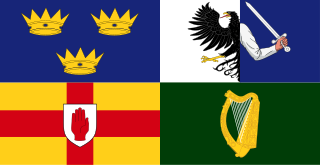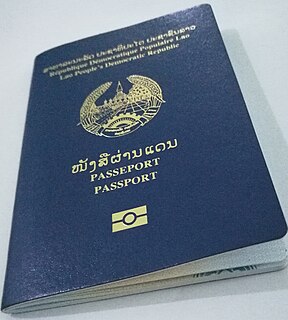This page is based on this
Wikipedia article Text is available under the
CC BY-SA 4.0 license; additional terms may apply.
Images, videos and audio are available under their respective licenses.
Punt or punting may refer to:
A surname, family name, or last name is the portion of a personal name that indicates a person's family. Depending on the culture, all members of a family unit may have identical surnames or there may be variations based on the cultural rules.

A given name is a part of a person's personal name. It identifies a specific person, and differentiates that person from the other members of a group who have a common surname. The term given name refers to the fact that the name usually is bestowed upon a person, normally to a child by his or her parents at or close to the time of birth. A Christian name, a first name which historically was given at baptism, is now also typically given by the parents at birth.
Hick is a surname or a nickname. Notable people with the name include:

The Irish are a Celtic nation and ethnic group native to the island of Ireland, who share a common Irish ancestry, identity and culture. Ireland has been inhabited for about 12,500 years according to archaeological studies. For most of Ireland's recorded history, the Irish have been primarily a Gaelic people. Anglo-Normans conquered parts of Ireland in the 12th century, while England's 16th/17th-century (re)conquest and colonisation of Ireland brought a large number of English and Lowland Scots people to parts of the island, especially the north. Today, Ireland is made up of the Republic of Ireland and the smaller Northern Ireland. The people of Northern Ireland hold various national identities including British, Irish, Northern Irish or some combination thereof.
A large number of ethnic Chinese people have lived in Indonesia for many centuries. Over time, especially under social and political pressure during the New Order era, most Chinese Indonesians have adopted names that better match the local language.

Affordable housing is housing which is deemed affordable to those with a median household income or below as rated by the national government or a local government by a recognized housing affordability index. Most of the literature on affordable housing refers to mortgages and number of forms that exist along a continuum – from emergency shelters, to transitional housing, to non-market rental, to formal and informal rental, indigenous housing, and ending with affordable home ownership.
Wilson is an English and Scottish surname, common in the English-speaking world. The name is derived from a patronymic form of Will, a popular medieval name. The medieval Will is derived from any of several names containing the first Germanic element wil, meaning "desire". Possibly the most common of these names was William, derived from elements wil and helm, meaning "desire" and "helmet", "protection". The surname Wilson is first recorded in England as Willeson in 1324, and in Scotland as Wulson in 1405.
Williams is a patronymic form of the name William that originated in medieval England and Wales. The meaning is derived from son or descendant of William, the Northern French form that also gave the English name William. Derived from an Old French given name with Germanic elements; will = desire, will; and helm = helmet, protection. It is the second most common surname in New Zealand; third most common in Wales and the United States and fourth most common in Australia.
Gow is a Scottish surname. The name is derived from the Gaelic gobha, meaning 'smith'. The name is represented in Scottish Gaelic as Gobha.
The surname McArdle or MacArdle was the twelfth most numerous in its homeland of County Monaghan in 1970. The surname in Irish is MacArdghail, from ardghal, meaning 'high valour' or from the Irish "ardghail" meaning "tall foreigner" with roots "ard" meaning "tall" and "gail" meaning "foreigner" indicative of their original ancestor being a Viking or from Viking stock. The surname is also common in County Armagh and County Louth.
The surname Hurley has become the English version of at least three distinct original Irish names: the Ó hUirthile, part of the Dál gCais tribal group, based in Clare and North Tipperary; the Ó Muirthile, from the environs of Kilbrittain in west Cork; and the Ó hIarlatha, from the district of Ballyvourney, also in Cork, whose name is more usually anglicised "(O')Herlihy". The principal concentrations of Hurleys are today found in counties Tipperary and Limerick, where they spread from the original Dalcassian homeland, and in Cork. An interesting example of the pseudo-translation of surnames is found in Clare, where some whose name was originally Hurley have now adopted the surname "Commane", since the Irish for the hurley-stick used in the sport of hurling is camán while the name "Commane" does not originate from that source.
Norman is both a surname and a given name. The surname has multiple origins including English, Irish, Scottish, German, Norwegian, Ashkenazi Jewish and Jewish American. The given name Norman is mostly of English origin, though in some cases it can be an Anglicised form of a Scottish Gaelic personal name.
Clarke is an Anglo-Irish surname which means "clerk". The surname is of English and Irish origin but the original word comes from Latin for clericus. There are some surname variants, including the Clerk and Clark which predates Clarke by over 700 years. Clarke is also uncommonly chosen as a given name.
Randles is a surname which may refer to:

Laotian passports are issued to citizens of (Laos) by Consular Department within the Ministry of Foreign Affairs to travel internationally. The have been issued since 30 June 2016.
The term afford may refer to:





